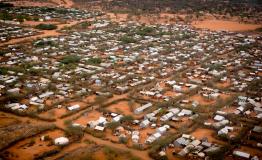

Mental Health
The psychological impact of delivering emergency aid can be severe. Our teams provide emergency medical aid in catastrophes all over the world — armed conflicts, natural disasters, famines and epidemics.
However, for people who have lived through these terrible events, survival goes beyond ensuring physical wellbeing.
These figures dramatically increase when factors such as violence, persecution, the need to flee, disasters or a lack of access to healthcare are involved.
For this reason, in 1998 MSF formally recognised the need to provide mental health and psychosocial care as part of our emergency work.
Our response to mental health
People caught in the wake of a humanitarian crisis can suffer from debilitating depression and anxiety, including conditions such as post-traumatic stress disorder (PTSD).
Many patients seen by MSF will have been separated from their families or witnessed the deaths of loved ones. Others may have been forced to flee, searching for shelter, supplies and safety. These events can immobilise people with depression and anxiety at a time when they need to take action for themselves and their families.
MSF professionals are there to listen and support so that traumatic experiences do not come to define our patients' lives.
In 2020, our mental health teams provided 349,500 individual consultations across our projects.
Mental healthcare also forms a crucial part of our services for HIV/AIDS, tuberculosis, malnutrition, sexual violence and disease outbreaks.
Our primary aim is to reduce people’s symptoms and improve their ability to function. Often this work is done by local counsellors specially trained by MSF, while our psychologists or psychiatrists provide technical support and clinical supervision.
At the same time, specialised clinicians are available to treat severe mental illness. However, this accounts for a minority of the cases seen by MSF.
People seek mental health support for many reasons — the agonising loss of a child in an earthquake, the trauma of sexual violence, getting caught up in a conflict. MSF mental health workers listen to their stories and focus on helping them find ways to cope and continue with their lives.
Being forced from home is a particular problem for people already suffering from mental health problems. They can lose access to existing treatment and routine care, which may cause them to develop further symptoms or more severe conditions.
However, treating severely disturbed people remains a challenge for MSF teams, given the complexity of managing psychiatric medication and treatment. Increasing our capacity to treat these illnesses remains a priority for MSF.
Establishing mental healthcare programmes in emergencies is not straightforward, mainly when violence and trauma may be ongoing, or language and cultural barriers may prevent people from seeking support. Our community outreach teams increasingly play an essential part in tackling this.
It is often difficult to guarantee continuity of care in unstable and dangerous settings. However, the needs are high, and MSF continues to expand its mental health programmes.
For MSF's emergency response work to be carried out, there is another crucial issue: the mental health of our teams.
Often away from home for long periods, working under pressure and required to process traumatic events, humanitarian aid workers must also be given the professional support and headspace they need.
Local MSF staff will often come directly from the communities receiving our care. While this is useful for our teams to understand social and cultural issues better, it also means that these staff members are closer to the same traumatic events experienced by our patients. Our local staff, therefore, receive psychological support.
For international team members, coming home from an assignment is often the time when mental health support becomes the most necessary. Many struggle with the knowledge that, for their patients, returning home may not be an option. However, MSF remains committed to helping our staff re-adapt to their routines and process their experiences.


SHUT OUT & FORGOTTEN

Tips to De-Stress
![Kidnapping of migrants has been for a while now a lucrative business for the criminal gangs operating in the Mexican northern cities bordering the US. [photo: Juan Carlos Tomasi] Kidnapping of migrants has been for a while now a lucrative business for the criminal gangs operating in the Mexican northern cities bordering the US. [photo: Juan Carlos Tomasi]](/sites/default/files/styles/card_half/public/msfimages/news/msf236305_medium.jpg?itok=fOU6t4E0)
Increase in kidnappings and extreme violence against migrants on the southern border of Mexico

Travelling the world for better mental health care
![Thousands of life jackets left behind by arriving migrants are gathered at a dump on Lesbos Island, Greece. [ © Robin Hammond/Witness Change] Thousands of life jackets left behind by arriving migrants are gathered at a dump on Lesbos Island, Greece. [ © Robin Hammond/Witness Change]](/sites/default/files/styles/card_half/public/msfimages/news/msf237451_medium.jpg?itok=mNyVBMWU)